1089
120 years of life - just the beginning. How to beat the aging
Discuss any issues of health should be with the knowledge of the nonlinearity of biological processes, with the understanding that the same principle or substance may behave differently depending on usage, individual characteristics, and many other aspects. Therefore, the discussion is often "good" in itself does not make sense. In this article I will discuss the paradox of methionine.
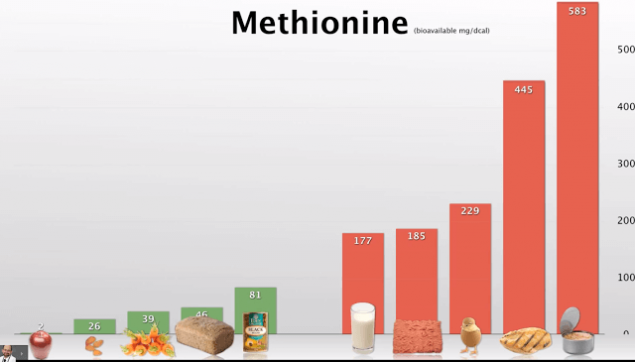
Why the paradox?
Traditionally referred to as methionine and antioxidants factors that prevent aging. But at the same time limiting its content in food leads to an increase in life expectancy. How does this happen? Let's face it. There is no consensus on this issue yet, but it should be borne in mind that, first, the antioxidants in excess are pro-oxidants, secondly, methionine - the bare amino acid biosynthesis of any protein, and the decrease of gross protein synthesis conserves energy in the processes of repair and stress.
On the one hand, this methionine - an essential aliphatic sulfur containing amino acid, which is vital to human health. Methionine is not synthesized in the human body, and so the only natural way of replenishment of this amino acid is a diet containing methionine rich food products. Methionine as a source of sulfur in the biosynthesis of cysteine. Methionine serves as a donor of methyl groups body (consisting of S-adenosyl-methionine), the biosynthesis of choline, adrenaline. A sufficient amount of methionine is an essential factor for the start of new protein synthesis in the body. When methionine is not enough, then the rate of protein synthesis decreases.

On the other hand, it was found that the amino acid methionine, and BTSAA amino acids (leucine, isoleucine and valine) stimulate the activity of the signal protein - kinase TOR. protein kinase TOR activity reduces life expectancy because of the fact that this protein activates the processes of synthesis of new proteins in orgasm at the expense of "recycling" of old that just clog up the cell. Elevated levels of the old damaged proteins leads to accelerated aging of body cells. It turns out that the reduction in methionine diet significantly prolong the life of man. As it turned out the high level of methionine in the diet reduces life expectancy, obesity triggers (direct factor for stroke and heart attack), increases cell receptor sensitivity to insulin (triggers diabetes and arteriosclerosis), increases blood sugar levels. Diets low in methionine show surprising results. They reduce the risk of some diseases and prolong life expectancy. Let's understand this paradox!
Life Extension and nizkometioninovaya diet.
Scientists at the Cancer Center of the Mexican Oasis of Hope Hospital recently published a review in which the offer to use the restriction of methionine intake (PSO) as a strategy to prolong life.
Recent studies have shown that the restriction of methionine intake with food increases the average and maximum lifespan in rats and mice. This anti-aging effects were similar to those of caloric restriction, including the suppression of the production of reactive oxygen species (ROS) in mitochondria.
It has been found that limiting the consumption of methionine leads to decrease in plasma insulin levels IFR1, glucose and thyroid hormones. In addition, the mice fed a limited diet, decreased age-related changes, such as cataract, changes in subpopulations of T-lymphocytes and oxidative stress in the liver. And the effect of limiting methionine consumption is not associated with restricted intake of calories. Some of the effects of peacekeeping operations associated with decreased synthesis in the liver IFR1. But the rodents decline in consumption of any essential amino acid is a similar effect.
Methionine, as we have said, is a donor of methyl groups, and is a precursor of taurine, polyamines, glutathione and sulfate. Some of these features can make cysteine with DMR diet therefore contain no cysteine and most of the other amino acids. The mechanism of the increase in life expectancy while limiting intake of other amino acids is not yet clear. Another effect is the reduction of ROS PKO synthesis in the mitochondrial respiratory chain that reduces oxidative damage to mitochondrial DNA and proteins.
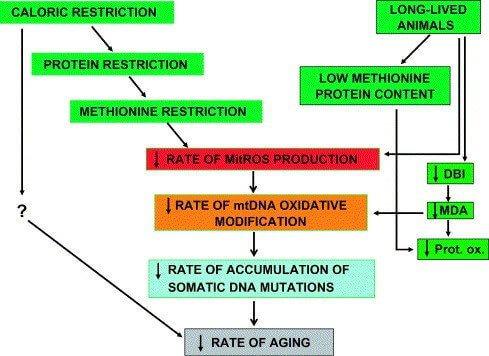
The overabundance of methionine in the body.
The more dangerous overabundance of methionine in the body? As we have said, methionine is a donor of methyl groups in the body, this function is carried out by him in the form of S-adenosyl-methionine (SAM, Heptral). Excess methylation may be a factor leading to the development of Parkinson's disease (PD) - heavy age-associated disease. Injections of SAM in rat brain resulted in changes similar to BP. Hydrolysis of the ester bond between the methylated and the methyl group of the protein results in the formation of methanol. The methanol is oxidized to formaldehyde, which in turn is oxidized to formic acid.
The Department of Neurology Meharry Medical College researchers are investigating the role of SAM in the production of these toxic substances in the brain of rats and their toxicity to PC12 cell line, which is used as a model for the differentiation of neural tissue. They found that SAM enhances the formation of methanol, formaldehyde and formic acid according to the concentration and time of action. Additionally, formaldehyde is the most toxic to PC12 cells in cell culture studies of this it can be concluded that formaldehyde, which is formed in the body, can lead to neuronal damage under the excess methylation.
Sub-toxic concentration of formaldehyde reduced expression of tyrosine hydroxylase, the limiting factor of the synthesis of dopamine. Formaldehyde is more toxic to catecholaminergic PC12 cells than in C6 glioma cells, suggesting that the neurons are more sensitive to formaldehyde than glia. Based on these results it was concluded: excessive methylation of proteins involved in the occurrence of SAM-induced PD-like changes and the aging process, this process is associated with toxic effects of formaldehyde.
Methionine and neoplastic diseases.
It is known that in cancer cells is an intensive protein synthesis. Therefore nizkometioninovaya diet has the ability to slow the growth of tumors and make them more sensitive to therapy. Bezmetioninovaya diet improved the response of triple negative breast cancer in mice. Employees of the University of Wisconsin (University of Wisconsin) was published in the journal Clinical Cancer Research results of their work, which proved that depriving tumor cells of certain nutrients, possible through diet, increases the sensitivity of tumors to targeted therapies.
There is clinical evidence that a diet low in methionine improves for certain cancers. The mechanisms of this phenomenon are unknown. It has been shown that the lack of activity of methionine increases the signal-related receptor TRAIL-R2. The authors of this study tested whether methionine stress increase the sensitivity of breast cancer cells to pro-apoptotic agonists of TRAIL-R2.
The cell culture of triple negative breast cancer depleted methionine was found increased expression of TRAIL-R2 receptor gene. This meant sensitization of cells to a receptor agonist which activation induced apoptosis. It was confirmed that this effect is not manifested methionine deficiency in healthy cells. Thus, it is possible to selectively increase the sensitivity of tumor cells to the agonist TRAIL-R2.
"The results showed that lack methionine exerts a specific effect on the molecular pathways responsible for cell death. Vulnerability to treatment of cancer cells, the effects on these pathways, thus increased, "- says Dr. Kraynz. "This finding is really impressive, since it means that compliance with a special diet can increase the effectiveness of targeted therapies. " And the man, and rodents are able to tolerate the absence of methionine for some time. In the experiment, mice were depleted of methionine diet on transplanted tumors with triple negative breast cancer injected antibody which binds to a receptor TRAIL-R2. Food and drug combination was significantly more effective changes only drug therapy.
By the way, surely you know that certain animals can detect cancer sniffing. The fact that cancer cells, consuming large amounts of methionine, sulfur emit gases that trap and its smell dogs, trained to "smell cancer." Dogs determine lung cancer, smelling breath, skin cancer - sniffing the skin, colon cancer, cancer of the urinary tract, sniffing the allocation of those bodies.
High levels of homocysteine.
Nizkometioninovaya diet is also recommended for people with high levels of homocysteine, it is often the case with mutations of certain genes. Methionine is not formed in the human body, and comes only with food. Those who have a mutation in the genes of the folate cycle (MTHFR, MTR, MTRR), and who have elevated levels of homocysteine, you should avoid foods high in methionine, because it increases homocysteine. But about homocysteine is a separate conversation.
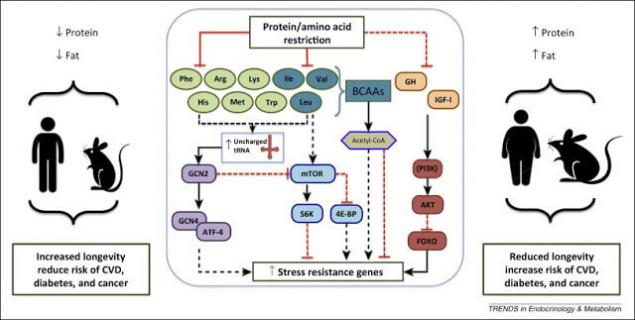
The key to understanding the action of methionine.
Thus, the effect of methionine on the life expectancy depends on the activity of a particular signaling protein - kinase TOR's, which is in response to the flow of amino acids in cell growth signals and activates processes of the biosynthesis of the body's own proteins and inhibits their disposal (autophagy).
Methionine - an amino acid that begins the biosynthesis of each protein, and its lack of protein metabolism inevitably slows down and stimulates autophagy. The body is released from the intensive protein with injuries and other debris. On the other hand, the smaller protein is produced in a cell, the better the auxiliary cell system to cope with the laying of the spatial structure of existing proteins. But with a high level of protein biosynthesis occurring "chaos" can damage or even kill the cell, accelerating the aging process.
A few amino acids - leucine, isoleucine and valine - also stimulate the function of the kinase TOR. Amino acids valine most protein in beef, chicken, peas, egg; isoleucine rich in milk, meat and eggs; leucine - milk, oats, corn. In addition to increasing the maximum lifespan in mammals nizkometioninovaya diet reduces the risk of obesity, increases the resistance to diseases of the liver, reducing insulin levels and insulin-like growth factor and thyroid hormones.
The solution of the paradox.
Hence the paradox of the decision are as follows: the older the person, the more he should be vegetarians. Complete restriction of methionine is highly undesirable because it is an essential amino acid vital for many bodily systems!
But this process must also be reasonable, what we must learn from our ancestors: if the average add up all the positions, approximately half the time our ancestors were vegetarians, and the half - meat-eaters. A reasonable approach. Full veganism is not a healthy diet, and a low awareness dieticheskoey it can cause serious harm. The excess of red meat, vegetables and ponichikov - all bad.
Observe moderation - is the best strategy, which originates from the time of hunter-gatherers. Vegetarian dishes, which were collected mostly women, was every day. But the meat, which was mined predominantly male hunting was not every day. Therefore, the food was meat our ancestors rare, but abundant.
Also, in the case of methionine, supply is very important context. Very often it is not just in the amount of methionine (see. Figure below), and how it is metabolized in the body. Therefore, a person consuming the meat with a sufficient amount of vegetables, methionine is metabolized better than strict vegan deficient vitamin 12. Adverse methionine properties manifested most strongly in a number of vitamin deficiency, especially of folate and vitamin B6 and B12 particularly, choline and and glycine. These compounds are in sufficient quantities and in animal food. Therefore, Focus on the diversity of food, to secure a balanced diet.
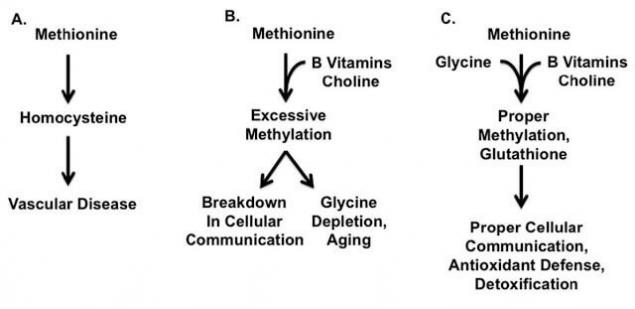
Practice nizkometioninovoy diet.
Despite the scientific name, nizkometioninovaya diet known to all for a long time. The smallest amount of methionine contain vegetable proteins, and the largest - the animals. Therefore, the slower growing person, the less it is necessary in the diet of methionine. So with 30 years should limit meat and dairy products, with 50 further limit their intake. This limitation does not necessarily have to be constant, as effective a time limit (post). Animal proteins (meat, poultry, fish) is limited, in part (but not all!), Replacing them with vegetable. By the way, is the ratio of proteins has proved itself in practice: the famous island of Okinawa longevity of the population is associated with typical diet of the same name for this island, which is also a low-calorie, and contains a small amount of animal protein. Vegetables and fruits have a minimum content of methionine (10 mg)
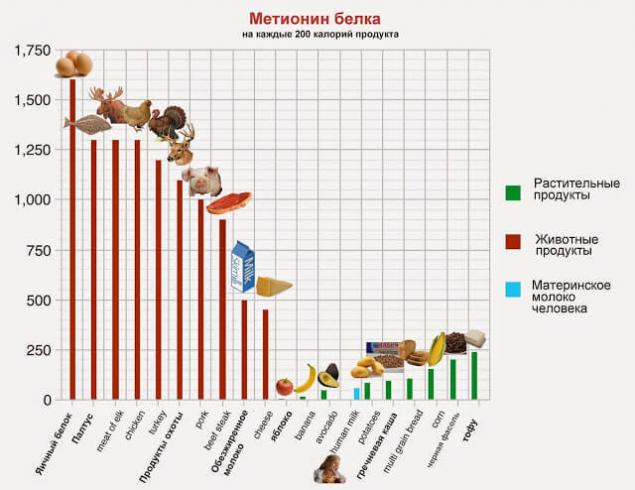
Nizkometioninovaya diet
For several reasons, a voluntary restriction of food will never enjoy wide popularity among the people, but it can replace methionine restriction of consumption that can be achieved using mostly (but not completely!) Vegetarian diet low in the amino acids. I remind you that you can make a post or veggie 2-3 days a week for the therapeutic effect. Vegetable proteins, especially from legumes and nuts, contain less methionine than animal protein. In addition, the total protein content of the vegetable products is lower than in animal products.
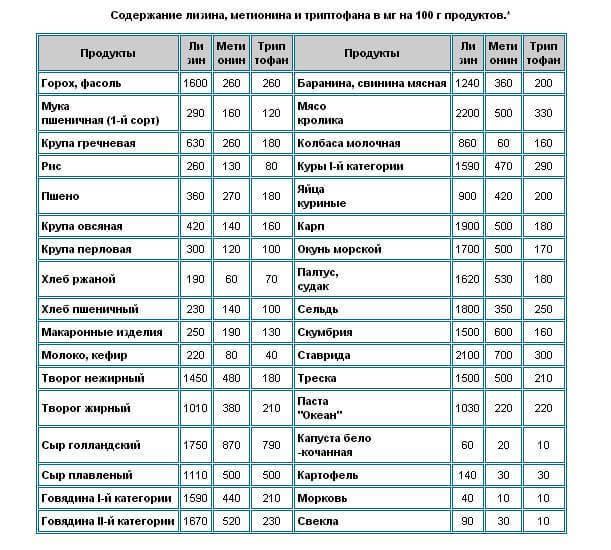

Why the paradox?
Traditionally referred to as methionine and antioxidants factors that prevent aging. But at the same time limiting its content in food leads to an increase in life expectancy. How does this happen? Let's face it. There is no consensus on this issue yet, but it should be borne in mind that, first, the antioxidants in excess are pro-oxidants, secondly, methionine - the bare amino acid biosynthesis of any protein, and the decrease of gross protein synthesis conserves energy in the processes of repair and stress.
On the one hand, this methionine - an essential aliphatic sulfur containing amino acid, which is vital to human health. Methionine is not synthesized in the human body, and so the only natural way of replenishment of this amino acid is a diet containing methionine rich food products. Methionine as a source of sulfur in the biosynthesis of cysteine. Methionine serves as a donor of methyl groups body (consisting of S-adenosyl-methionine), the biosynthesis of choline, adrenaline. A sufficient amount of methionine is an essential factor for the start of new protein synthesis in the body. When methionine is not enough, then the rate of protein synthesis decreases.

On the other hand, it was found that the amino acid methionine, and BTSAA amino acids (leucine, isoleucine and valine) stimulate the activity of the signal protein - kinase TOR. protein kinase TOR activity reduces life expectancy because of the fact that this protein activates the processes of synthesis of new proteins in orgasm at the expense of "recycling" of old that just clog up the cell. Elevated levels of the old damaged proteins leads to accelerated aging of body cells. It turns out that the reduction in methionine diet significantly prolong the life of man. As it turned out the high level of methionine in the diet reduces life expectancy, obesity triggers (direct factor for stroke and heart attack), increases cell receptor sensitivity to insulin (triggers diabetes and arteriosclerosis), increases blood sugar levels. Diets low in methionine show surprising results. They reduce the risk of some diseases and prolong life expectancy. Let's understand this paradox!
Life Extension and nizkometioninovaya diet.
Scientists at the Cancer Center of the Mexican Oasis of Hope Hospital recently published a review in which the offer to use the restriction of methionine intake (PSO) as a strategy to prolong life.
Recent studies have shown that the restriction of methionine intake with food increases the average and maximum lifespan in rats and mice. This anti-aging effects were similar to those of caloric restriction, including the suppression of the production of reactive oxygen species (ROS) in mitochondria.
It has been found that limiting the consumption of methionine leads to decrease in plasma insulin levels IFR1, glucose and thyroid hormones. In addition, the mice fed a limited diet, decreased age-related changes, such as cataract, changes in subpopulations of T-lymphocytes and oxidative stress in the liver. And the effect of limiting methionine consumption is not associated with restricted intake of calories. Some of the effects of peacekeeping operations associated with decreased synthesis in the liver IFR1. But the rodents decline in consumption of any essential amino acid is a similar effect.
Methionine, as we have said, is a donor of methyl groups, and is a precursor of taurine, polyamines, glutathione and sulfate. Some of these features can make cysteine with DMR diet therefore contain no cysteine and most of the other amino acids. The mechanism of the increase in life expectancy while limiting intake of other amino acids is not yet clear. Another effect is the reduction of ROS PKO synthesis in the mitochondrial respiratory chain that reduces oxidative damage to mitochondrial DNA and proteins.

The overabundance of methionine in the body.
The more dangerous overabundance of methionine in the body? As we have said, methionine is a donor of methyl groups in the body, this function is carried out by him in the form of S-adenosyl-methionine (SAM, Heptral). Excess methylation may be a factor leading to the development of Parkinson's disease (PD) - heavy age-associated disease. Injections of SAM in rat brain resulted in changes similar to BP. Hydrolysis of the ester bond between the methylated and the methyl group of the protein results in the formation of methanol. The methanol is oxidized to formaldehyde, which in turn is oxidized to formic acid.
The Department of Neurology Meharry Medical College researchers are investigating the role of SAM in the production of these toxic substances in the brain of rats and their toxicity to PC12 cell line, which is used as a model for the differentiation of neural tissue. They found that SAM enhances the formation of methanol, formaldehyde and formic acid according to the concentration and time of action. Additionally, formaldehyde is the most toxic to PC12 cells in cell culture studies of this it can be concluded that formaldehyde, which is formed in the body, can lead to neuronal damage under the excess methylation.
Sub-toxic concentration of formaldehyde reduced expression of tyrosine hydroxylase, the limiting factor of the synthesis of dopamine. Formaldehyde is more toxic to catecholaminergic PC12 cells than in C6 glioma cells, suggesting that the neurons are more sensitive to formaldehyde than glia. Based on these results it was concluded: excessive methylation of proteins involved in the occurrence of SAM-induced PD-like changes and the aging process, this process is associated with toxic effects of formaldehyde.
Methionine and neoplastic diseases.
It is known that in cancer cells is an intensive protein synthesis. Therefore nizkometioninovaya diet has the ability to slow the growth of tumors and make them more sensitive to therapy. Bezmetioninovaya diet improved the response of triple negative breast cancer in mice. Employees of the University of Wisconsin (University of Wisconsin) was published in the journal Clinical Cancer Research results of their work, which proved that depriving tumor cells of certain nutrients, possible through diet, increases the sensitivity of tumors to targeted therapies.
There is clinical evidence that a diet low in methionine improves for certain cancers. The mechanisms of this phenomenon are unknown. It has been shown that the lack of activity of methionine increases the signal-related receptor TRAIL-R2. The authors of this study tested whether methionine stress increase the sensitivity of breast cancer cells to pro-apoptotic agonists of TRAIL-R2.
The cell culture of triple negative breast cancer depleted methionine was found increased expression of TRAIL-R2 receptor gene. This meant sensitization of cells to a receptor agonist which activation induced apoptosis. It was confirmed that this effect is not manifested methionine deficiency in healthy cells. Thus, it is possible to selectively increase the sensitivity of tumor cells to the agonist TRAIL-R2.
"The results showed that lack methionine exerts a specific effect on the molecular pathways responsible for cell death. Vulnerability to treatment of cancer cells, the effects on these pathways, thus increased, "- says Dr. Kraynz. "This finding is really impressive, since it means that compliance with a special diet can increase the effectiveness of targeted therapies. " And the man, and rodents are able to tolerate the absence of methionine for some time. In the experiment, mice were depleted of methionine diet on transplanted tumors with triple negative breast cancer injected antibody which binds to a receptor TRAIL-R2. Food and drug combination was significantly more effective changes only drug therapy.
By the way, surely you know that certain animals can detect cancer sniffing. The fact that cancer cells, consuming large amounts of methionine, sulfur emit gases that trap and its smell dogs, trained to "smell cancer." Dogs determine lung cancer, smelling breath, skin cancer - sniffing the skin, colon cancer, cancer of the urinary tract, sniffing the allocation of those bodies.
High levels of homocysteine.
Nizkometioninovaya diet is also recommended for people with high levels of homocysteine, it is often the case with mutations of certain genes. Methionine is not formed in the human body, and comes only with food. Those who have a mutation in the genes of the folate cycle (MTHFR, MTR, MTRR), and who have elevated levels of homocysteine, you should avoid foods high in methionine, because it increases homocysteine. But about homocysteine is a separate conversation.

The key to understanding the action of methionine.
Thus, the effect of methionine on the life expectancy depends on the activity of a particular signaling protein - kinase TOR's, which is in response to the flow of amino acids in cell growth signals and activates processes of the biosynthesis of the body's own proteins and inhibits their disposal (autophagy).
Methionine - an amino acid that begins the biosynthesis of each protein, and its lack of protein metabolism inevitably slows down and stimulates autophagy. The body is released from the intensive protein with injuries and other debris. On the other hand, the smaller protein is produced in a cell, the better the auxiliary cell system to cope with the laying of the spatial structure of existing proteins. But with a high level of protein biosynthesis occurring "chaos" can damage or even kill the cell, accelerating the aging process.
A few amino acids - leucine, isoleucine and valine - also stimulate the function of the kinase TOR. Amino acids valine most protein in beef, chicken, peas, egg; isoleucine rich in milk, meat and eggs; leucine - milk, oats, corn. In addition to increasing the maximum lifespan in mammals nizkometioninovaya diet reduces the risk of obesity, increases the resistance to diseases of the liver, reducing insulin levels and insulin-like growth factor and thyroid hormones.
The solution of the paradox.
Hence the paradox of the decision are as follows: the older the person, the more he should be vegetarians. Complete restriction of methionine is highly undesirable because it is an essential amino acid vital for many bodily systems!
But this process must also be reasonable, what we must learn from our ancestors: if the average add up all the positions, approximately half the time our ancestors were vegetarians, and the half - meat-eaters. A reasonable approach. Full veganism is not a healthy diet, and a low awareness dieticheskoey it can cause serious harm. The excess of red meat, vegetables and ponichikov - all bad.
Observe moderation - is the best strategy, which originates from the time of hunter-gatherers. Vegetarian dishes, which were collected mostly women, was every day. But the meat, which was mined predominantly male hunting was not every day. Therefore, the food was meat our ancestors rare, but abundant.
Also, in the case of methionine, supply is very important context. Very often it is not just in the amount of methionine (see. Figure below), and how it is metabolized in the body. Therefore, a person consuming the meat with a sufficient amount of vegetables, methionine is metabolized better than strict vegan deficient vitamin 12. Adverse methionine properties manifested most strongly in a number of vitamin deficiency, especially of folate and vitamin B6 and B12 particularly, choline and and glycine. These compounds are in sufficient quantities and in animal food. Therefore, Focus on the diversity of food, to secure a balanced diet.

Practice nizkometioninovoy diet.
Despite the scientific name, nizkometioninovaya diet known to all for a long time. The smallest amount of methionine contain vegetable proteins, and the largest - the animals. Therefore, the slower growing person, the less it is necessary in the diet of methionine. So with 30 years should limit meat and dairy products, with 50 further limit their intake. This limitation does not necessarily have to be constant, as effective a time limit (post). Animal proteins (meat, poultry, fish) is limited, in part (but not all!), Replacing them with vegetable. By the way, is the ratio of proteins has proved itself in practice: the famous island of Okinawa longevity of the population is associated with typical diet of the same name for this island, which is also a low-calorie, and contains a small amount of animal protein. Vegetables and fruits have a minimum content of methionine (10 mg)

Nizkometioninovaya diet
For several reasons, a voluntary restriction of food will never enjoy wide popularity among the people, but it can replace methionine restriction of consumption that can be achieved using mostly (but not completely!) Vegetarian diet low in the amino acids. I remind you that you can make a post or veggie 2-3 days a week for the therapeutic effect. Vegetable proteins, especially from legumes and nuts, contain less methionine than animal protein. In addition, the total protein content of the vegetable products is lower than in animal products.

Healing Technique from the disease, which has no analogues. All thanks to one procedure!
The skin, like a baby! Miracle Facial
























